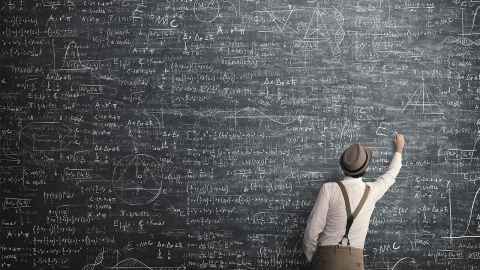Being bad at maths is not a badge of honour
6 August 2019
Opinion: Dr Rhys Jones challenges the assumption that it's okay to be bad at maths and explains why it's no less important than being able to read or write.

Have you ever been scared stiff of a spider in the bathroom and screamed as loud as you can? Then did you look around and see your children staring at you? And then did you wonder why they develop a phobia for spiders?
The same can be true for maths. So many of us say “Aw I can’t do maths” or “I’m so bad at maths.” We wear it like a badge of honour, it’s accepted throughout western society: it’s okay to be bad at maths, who cares anyway, right? When am I going to use trigonometry in my life?
So who should care about being bad at maths? Everyone! If you said the same thing about reading and writing, people might look at you funny. Why is it not okay to admit if you can’t read or write, but socially acceptable to say you can’t do maths?
Maths skills are essential – we use them all the time, without even knowing it. We use them when we shop (online or in person at a store), cook food, track how much money we spend over a week, and to guess how long certain activities will take. The list goes on and on.
Many of us use calculators to perform simple tasks, but what can happen if your bad-at-maths belief means you can’t complete even the simplest calculation in your head? Well, you can be screwed. So many times I’ve been at a checkout and the cashier may have charged me twice for something. Because I have an idea in my head how much the total should be, when I’m charged more than expected I can question why. If I were bad at maths, how would I know something was wrong?
We are living in an age where data is everywhere, it’s all around us. And as our lives become increasingly digitised being able to make sense of this world full of data requires basic maths skills, as well as developing statistical skills, which involves being able to describe and analyse it.
Why is it not okay to admit if you can’t read or write, but socially acceptable to say you can’t do maths?
People should see maths and statistics as a set of languages essential to live. Statistics in particular can help you predict the outcome of an event, using data from past events, and can show you interesting patterns about all sorts of things. For example, which age groups are more likely to use Instagram? Do people watch live TV anymore? Which age group is more likely to watch Netflix and Prime TV? When is the supermarket more likely to be quiet?
People who can use numbers and make sense of data are very valuable. Spotting patterns and trends in data means mega bucks for companies and governments all over the world. If you have these skills, not only will it help in life, taken to the next level, it can mean a great job with great pay.
The surprising thing about statistics is that, at an introductory level, you don’t actually need to be that good at maths. Developing statistical literacy skills is a big part of being able to communicate interesting patterns in data. Being able to describe data is an essential part of learning statistics, which can involve explaining the spread of data on a graph or in a table.
Data is all around us and comes in many different forms, not just numerical. It’s the scaffold for everything we know about everything. Becoming comfortable with numbers builds confidence and helps people overcome their anxieties with maths and statistics.
It is never too late to improve your skills in numeracy and statistics. There are many introductory courses available and they often run in the evenings or weekends to fit around other commitments. They also provide an opportunity to meet new people, people who are probably in the same boat as you.
So next time you find yourself saying out loud “I’m bad at maths” think about the impact it could have on people around you, especially your children. Instead, maybe you could say: “I wish I was better at maths” and then you could see it as a challenge. Wouldn’t it make you feel so much better if you could say: “Here, let me help – I can do maths.”
Dr Rhys Jones is a professional teaching fellow in the Department of Statistics.
This article reflects the opinion of the author and not necessarily the views of the University of Auckland.
Used with permission from Newsroom Being bad at maths is not a badge of honour on 30 July 2019.
Media queries
Alison Sims | Research Communications Editor
DDI 09 923 4953
Mob 021 249 0089
Email alison.sims@auckland.ac.nz